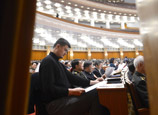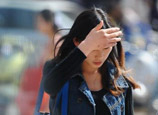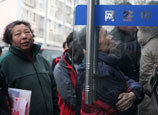
 |
| Nine Songs, a production by Asia's foremost dance company Cloud Gate, is a poetic tribute to those we should hold in reverence. (China Daily) |
To fully appreciate Nine Songs, audiences need to know more than the Chinese language and culture. Raymond Zhou reviews.
Lin Hwai-min's Nine Songs is more than a recreation of ancient rituals or an amalgam of pagan extravaganzas. It is a perfect fusion of the past and the present. As a matter of fact, it subtly portrays the progress of spiritual activities as refracted through the modern prism. Nine Songs was originally a cycle of poems by Qu Yuan, a poet of the Chu Kingdom who lived some 2,300 years ago, before China became a unified country.
However, it did not seem to be the intention of the Cloud Gate founder and choreographer to faithfully recapture the content of the poem through the body language, but rather, he wanted to use it as a kind of springboard to pay tribute to all those whom we should hold in reverence.
Chinese, or Asians in general, do not worship only one god. We have all kinds of gods and goddesses. And you do not need to know who they are or what they do to understand the rites of each number. It takes an ethnologist or anthropologist to decipher the origin of each rite as Lin has taken liberally from all kinds of sources, including Taiwan indigenous tribes, cave carvings from Northwestern China, and harvesting celebrations from Indonesia.

















 Men experience life of pregnant women to mark International Women's Day
Men experience life of pregnant women to mark International Women's Day


![]()
